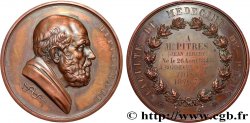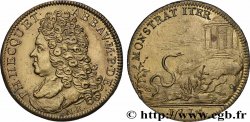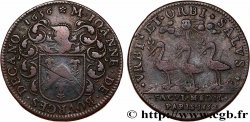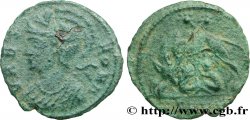fjt_744747 - DOYENS DE LA FACULTÉ DE MÉDECINE DE PARIS J. B. CHOMEL 1740
80.00 €
Menge
In den Warenkorb

Type : J. B. CHOMEL
Datum: 1740
Metall : Kupfer
Durchmesser : 28 mm
Stempelstellung : 6 h.
Gewicht : 6,91 g.
Rand Lisse
Seltenheitsgrad : R2
N° im Nachschlagewerk :
Pedigree :
Exemplaire provenant de la Collection MARINECHE
Vorderseite
Titulatur der Vorderseite J. B. CHOMEL. PARIS. F. M. P. DECANUS.
Beschreibung Vorderseite Le buste de Chomel à droite.
Rückseite
Titulatur der Rückseite URBI ET ORBI SALUS - FACUL. MEDIC. PARIS 1738 - 1739 - 1740.
Beschreibung Rückseite Trois cigognes allant à gauche, branche dans le bec, sous un soleil rayonnant à visage humain.
Kommentare
Frappe d’origine. Pierre-Jean-Baptiste Chomel est né à Paris en 1671. Docteur en 1697, il devient professeur de pharmacie et de matière médicale puis médecin du roi par quartier en 1706. Apprécié pour son savoir botanique, il est l’auteur d’un “Abrégé de l’Histoire des plantes usuelles” en trois volumes et qui eut neuf éditions. Son jardin, rue de l’Arbalète, est à l’origine de l’École de pharmacie. Doyen élu et réélu, il poursuit ardemment la lutte contre les chirurgiens et apothicaires et fait préparer les plans du nouvel amphithéâtre. Il meurt en juillet 1740 avant la fin de son second décanat.
Original strike. Pierre-Jean-Baptiste Chomel was born in Paris in 1671. Doctor in 1697, he became professor of pharmacy and materia medica then physician to the king by district in 1706. Appreciated for his botanical knowledge, he is the author of an “Abrégé de l'Histoire des plantes usuelles” in three volumes and which had nine editions. His garden, rue de l'Arbalète, is at the origin of the School of Pharmacy. Elected and re-elected dean, he ardently pursued the fight against surgeons and apothecaries and had the plans for the new amphitheater prepared. He died in July 1740 before the end of his second deanship
Original strike. Pierre-Jean-Baptiste Chomel was born in Paris in 1671. Doctor in 1697, he became professor of pharmacy and materia medica then physician to the king by district in 1706. Appreciated for his botanical knowledge, he is the author of an “Abrégé de l'Histoire des plantes usuelles” in three volumes and which had nine editions. His garden, rue de l'Arbalète, is at the origin of the School of Pharmacy. Elected and re-elected dean, he ardently pursued the fight against surgeons and apothecaries and had the plans for the new amphitheater prepared. He died in July 1740 before the end of his second deanship








 Berichten über einen Fehler
Berichten über einen Fehler Die Seite drucken
Die Seite drucken Teilen meiner Auswahl
Teilen meiner Auswahl Stellen Sie eine Frage
Stellen Sie eine Frage Einlieferung/Verkauf
Einlieferung/Verkauf
 Details
Details










